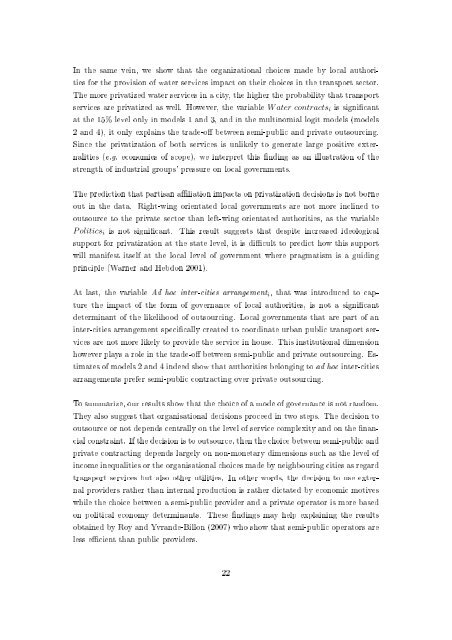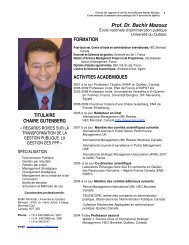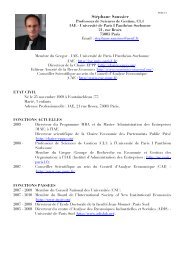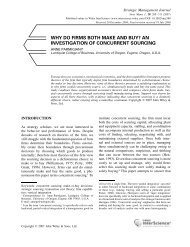Make or Buy Urban Public Transport Services: A Rational Choice?
Make or Buy Urban Public Transport Services: A Rational Choice?
Make or Buy Urban Public Transport Services: A Rational Choice?
You also want an ePaper? Increase the reach of your titles
YUMPU automatically turns print PDFs into web optimized ePapers that Google loves.
In the same vein, we show that the <strong>or</strong>ganizational choices made by local auth<strong>or</strong>ities<br />
f<strong>or</strong> the provision of water services impact on their choices in the transp<strong>or</strong>t sect<strong>or</strong>.<br />
The m<strong>or</strong>e privatized water services in a city, the higher the probability that transp<strong>or</strong>t<br />
services are privatized as well. However, the variable W ater contracts i is signicant<br />
at the 15% level only in models 1 and 3, and in the multinomial logit models (models<br />
2 and 4), it only explains the trade-o between semi-public and private outsourcing.<br />
Since the privatization of both services is unlikely to generate large positive externalities<br />
(e.g. economies of scope), we interpret this nding as an illustration of the<br />
strength of industrial groups' pressure on local governments.<br />
The prediction that partisan aliation impacts on privatization decisions is not b<strong>or</strong>ne<br />
out in the data. Right-wing <strong>or</strong>ientated local governments are not m<strong>or</strong>e inclined to<br />
outsource to the private sect<strong>or</strong> than left-wing <strong>or</strong>ientated auth<strong>or</strong>ities, as the variable<br />
P olitics i is not signicant. This result suggests that despite increased ideological<br />
supp<strong>or</strong>t f<strong>or</strong> privatization at the state level, it is dicult to predict how this supp<strong>or</strong>t<br />
will manifest itself at the local level of government where pragmatism is a guiding<br />
principle (Warner and Hebdon 2001).<br />
At last, the variable Ad hoc inter-cities arrangement i , that was introduced to capture<br />
the impact of the f<strong>or</strong>m of governance of local auth<strong>or</strong>ities, is not a signicant<br />
determinant of the likelihood of outsourcing. Local governments that are part of an<br />
inter-cities arrangement specically created to co<strong>or</strong>dinate urban public transp<strong>or</strong>t services<br />
are not m<strong>or</strong>e likely to provide the service in house. This institutional dimension<br />
however plays a role in the trade-o between semi-public and private outsourcing. Estimates<br />
of models 2 and 4 indeed show that auth<strong>or</strong>ities belonging to ad hoc inter-cities<br />
arrangements prefer semi-public contracting over private outsourcing.<br />
To summarize, our results show that the choice of a mode of governance is not random.<br />
They also suggest that <strong>or</strong>ganisational decisions proceed in two steps. The decision to<br />
outsource <strong>or</strong> not depends centrally on the level of service complexity and on the nancial<br />
constraint. If the decision is to outsource, then the choice between semi-public and<br />
private contracting depends largely on non-monetary dimensions such as the level of<br />
income inequalities <strong>or</strong> the <strong>or</strong>ganisational choices made by neighbouring cities as regard<br />
transp<strong>or</strong>t services but also other utilities. In other w<strong>or</strong>ds, the decision to use external<br />
providers rather than internal production is rather dictated by economic motives<br />
while the choice between a semi-public provider and a private operat<strong>or</strong> is m<strong>or</strong>e based<br />
on political economy determinants. These ndings may help explaining the results<br />
obtained by Roy and Yvrande-Billon (2007) who show that semi-public operat<strong>or</strong>s are<br />
less ecient than public providers.<br />
22





